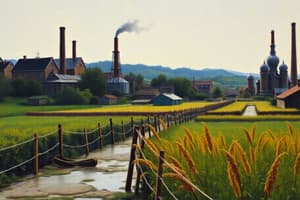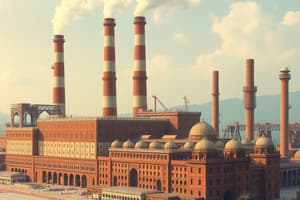Podcast
Questions and Answers
What role do geographers play in the manufacturing industry?
What role do geographers play in the manufacturing industry?
- Directly managing manufacturing facilities
- Promoting globalization and international trade
- Supplying raw materials for manufacturing processes
- Analyzing environmental impacts and helping minimize them (correct)
Why do manufacturers of electronics often choose to be near areas with abundant rare earth elements?
Why do manufacturers of electronics often choose to be near areas with abundant rare earth elements?
- To reduce shipping times and costs
- To have access to resources for their products (correct)
- To benefit from stable ground for factories
- To understand the spatial dynamics of innovations
What is a key factor influencing where factories are located according to the text?
What is a key factor influencing where factories are located according to the text?
- Environmental risks
- Geographical distribution of natural resources (correct)
- Technological advancements
- Availability of skilled labor
How can good transportation infrastructure benefit companies in reaching their markets?
How can good transportation infrastructure benefit companies in reaching their markets?
Why is understanding the spatial dynamics of innovations important in the manufacturing industry?
Why is understanding the spatial dynamics of innovations important in the manufacturing industry?
What aspect do geographers help companies with when it comes to global production networks?
What aspect do geographers help companies with when it comes to global production networks?
What is one of the primary concerns when setting up a manufacturing facility?
What is one of the primary concerns when setting up a manufacturing facility?
Why might companies choose to build factories close to mineral deposits or agricultural regions?
Why might companies choose to build factories close to mineral deposits or agricultural regions?
What role does geography play in the efficiency of transportation networks in the manufacturing industry?
What role does geography play in the efficiency of transportation networks in the manufacturing industry?
Why do manufacturing clusters often emerge in regions with skilled labor and supporting industries?
Why do manufacturing clusters often emerge in regions with skilled labor and supporting industries?
What aspect influences the location selection of manufacturing facilities besides proximity to raw materials?
What aspect influences the location selection of manufacturing facilities besides proximity to raw materials?
What are some factors geographers consider when determining the optimal site for a manufacturing facility?
What are some factors geographers consider when determining the optimal site for a manufacturing facility?
Study Notes
Manufacturing Industry and its Relationship with Geography
The manufacturing industry plays a crucial role in shaping the landscape of human activity across the globe. From raw material extraction to product assembly and distribution, the process spans vast distances and requires careful consideration of geographical factors. This interplay between geography and the manufacturing industry involves various aspects that influence the location selection of facilities, the design of products, and the management of resources.
Location Selection
One of the primary concerns when setting up a manufacturing facility is choosing the most suitable location. Geographers analyze various factors such as accessibility to raw materials, labor availability, infrastructure, and proximity to markets to determine the optimal site. For example, companies might choose to build factories close to mineral deposits or agricultural regions to reduce transportation costs and ensure a steady supply of raw materials. Additionally, manufacturing clusters often emerge in regions where there is a concentration of skilled labor, supporting industries, and infrastructure that facilitate efficient production.
Transportation and Infrastructure
The manufacturing industry relies heavily on transportation networks to move raw materials, semi-finished goods, and finished products. Geography plays a significant role in determining the efficiency and cost of these operations. Good transportation infrastructure, such as highways, railroads, and ports, can reduce shipping times and costs, making it easier for companies to reach their markets.
Resources and Materials
The manufacturing industry is heavily dependent on natural resources such as minerals, metals, and agricultural products. The geographical distribution of these resources influences where factories are located and what products can be manufactured. For instance, manufacturers of electronics often choose to be near areas with abundant supplies of rare earth elements, while textile industries may prefer regions with rich agricultural resources for fiber production.
Environmental Impact
Manufacturing processes can have significant environmental consequences, such as air and water pollution, waste generation, and land use changes. Geographers study the environmental impact of manufacturing activities and help companies minimize their environmental footprint. This can involve locating facilities in areas with lower environmental risks, such as areas with low seismic activity for factories that require stable ground, or in regions with adequate water resources to support water-intensive manufacturing processes.
Technology and Innovation
The manufacturing industry is constantly evolving, driven by advancements in technology and innovation. Geographers play a role in understanding the spatial dynamics of these innovations, such as the diffusion of new technologies and their impact on local economies and labor markets.
Globalization and International Trade
In an increasingly interconnected world, the manufacturing industry is affected by globalization and international trade. Geographers analyze the flows of goods, services, and capital across borders, helping companies understand the risks and opportunities associated with global production networks. This understanding is crucial for companies to make strategic decisions about where to locate facilities, source materials, and market their products.
Conclusion
The relationship between the manufacturing industry and geography is complex and multifaceted. Geographers contribute to the understanding of this relationship by studying the spatial aspects of manufacturing processes, from resource extraction to product distribution. This knowledge is essential for companies to make informed decisions about where to locate their facilities, how to manage their resources, and how to minimize their environmental impact.
Studying That Suits You
Use AI to generate personalized quizzes and flashcards to suit your learning preferences.
Description
Test your knowledge on how geography influences the manufacturing industry, from location selection to transportation, resources, environmental impact, technology, globalization, and more. Explore the interplay between geographical factors and manufacturing processes.




